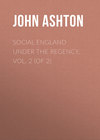Kitabı oku: «The Dawn of the XIXth Century in England», sayfa 19
CHAPTER XXXVIII
The Theatre – Number of theatres in London – Famous actors and actresses – Disturbances at a theatre – Master Betty, “The Infant Roscius” – His country experience – Puffs preliminary – His first appearance in London – Crowds to see him – Presented to the King and the Prince of Wales – Acts at Drury Lane – His subsequent career.
IN THE Dawn of the Nineteenth Century, the theatre was a favourite amusement for the good folks, probably because there were no other public forms of amusement, if we except an occasional concert or masquerade. The stage supplied this want, and the people took due advantage of it. The audience, through much frequenting, were critically educated, and demanded good acting. This, as a rule, they obtained, partially, as I think, because there were fewer actors, and, consequently, not so many mediocre performers as now, and partly owing to the constant change of performance – there being no “long runs,” as we know them, where an actor mechanically goes through the same part for hundreds of nights, until, like Sothern, he absolutely, and unconsciously, adopts his own mannerisms, and spoils himself for a fresh part.
The richer, and titled classes, were not content with witnessing professional skill, but strove to emulate and surpass the performers at their own amateur entertainments, and the most notable of these private societies was the Pic Nic Society.
There were eight Theatres in London, i. e., when one or other was not burnt down – namely, The King’s, Haymarket; Covent Garden; Drury Lane; Theatre Royal, Haymarket; The Royalty, in Goodman’s Fields; Sadlers Wells; Astley’s; and the Royal Circus, now the Surrey, on the other side the river.
Of course, as would be only natural, the best actors were at the West-end Theatres, and to show their calibre, one has only to mention such names as John Philip Kemble, Munden, Bannister, Dowton, Elliston, Liston, Mrs. Siddons, Fawcett, Mrs. Jordan, Kelly, Johnstone, Young, Cooke, &c. No wonder, that with such actors, the stage was popular. Their names are still a tradition of excellence to the profession, and the performances, with one notable exception, in the O. P. Riots, were listened to with great decorum, and there was a vast improvement upon the rougher manners of the previous century.
I can only find the mention of one fracas in the whole ten years, and the report of that, in the Annual Register, December 26, 1801, shows how very far the audience were from sympathizing with the offender. “At Covent Garden Theatre the holiday folks were inclined to be mischievous. As soon as the curtain drew up to commence the play of ‘Richard the Third,’ a wine glass was thrown on the stage by way of prologue, but without exciting much observation; a few minutes after, determined to attract notice, a quart bottle was thrown from the two-shilling gallery on the stage; it grazed the hat of Mr. Betterton, who was playing Tressel to Murray’s Henry VI., knocked out some of the jewels, and, falling on the stage, rolled down to the lamps unbroken. The audience were thunderstruck, the play stood still, and, for a few seconds, every one gazed with amazement. Satisfied of what had been done, a general burst of indignation broke out over the house, and ‘throw him over!’ ‘turn him out!’ were vociferated from all quarters. The villain was pointed out by his neighbours, sitting in the front row of the two-shilling gallery. He was seized, the people in the pit, and the boxes, rising up, and considerable agitation prevailed. The fellow, who was drunk, held by the iron railing, and refused to retire. This provoked the resentment against him still more, and the cries of vengeance were loud and general. Three or four laid hold of him, and seemed as if they would drag rail and all away; at last, they succeeded in taking him out of the theatre.”
In this decade appeared a theatrical phenomenon – the like of which has never been seen since; in the shape of a boy, who was endowed with a truly marvellous gift of acting – one Master William Henry West Betty, surnamed “The Infant Roscius,” who was born at Shrewsbury, September 13, 1791. His parents were extremely respectable, and in easy circumstances – so that it was not from need, but from pure inclination, that he adopted the stage as a profession. Whilst yet a child, he was fond of declamation with action, and, before he was twelve, he acted the part of Osman in Voltaire’s tragedy of Zara, at the Theatre, Belfast. He was, at that time, residing in Ireland, and the theatres, having been closed for some time previously, owing to the disturbed state of the country, were glad of any attraction when they did open – so Betty took an engagement at the above theatre, for four nights, on the understanding that he was to share the house, after deducting twelve pounds, for the expenses of the house. His first performance was on the 19th of August, 1803, when he was not yet twelve years old. Next day he was the talk of Belfast, and on the other three nights he played Norval, Rolla, and Romeo.
Then he went to Dublin, Cork, Glasgow, Edinburgh, and Birmingham, at which latter place he was heard by Mr. Justice Graham, one of the Board of Management of Drury Lane Theatre. He reported about the infant genius, and proposals were made, which were too low to be acceptable. He was afterwards engaged to play at Covent Garden, and, owing to an informality in the agreement, Drury Lane got hold of him on the intervening nights, at the same salary.
Whoever was his entrepreneur, he did his work well, and the puff preliminary was very delicately administered. The first notice of this kind that I can find, is in the Morning Herald, August 6, 1804. “A very extraordinary phenomenon has lately burst upon the theatrical world. A boy of the name of Beatie, not exceeding twelve years of age, reads and enacts all the principal of Shakespeare’s characters, in a stile of superiority that astonishes the most experienced Actors. He has performed in Ireland, and is now exciting general astonishment at Edinburgh. Off the stage his manners are puerile, as he is often seen playing at marbles in a morning, and Richard the Third in the evening. He is rather short of his age, slight made, but has great expression of countenance. The moment he begins to converse upon stage business, he appears an inspired being. He has a pleasant turn for repartee, which makes his company much sought for. The Edinburgh Manager expressed his fears, at first rehearsal, that his voice would not fill the house. ‘My dear Sir,’ replied the little hero of the buskin, ‘I beg you will be under no apprehensions upon that score, for, if my voice does not fill your house, probably my playing will!’”
Here is an anecdote of him, probably got up to suit the public. Morning Herald, November 16, 1804: “The Young Roscius, who is in all respects play ful, lately hesitated in going on the stage when he was to perform Richard. Young, the chief Liverpool actor, told him the stage was waiting, and urged him to appear. The boy declared, that, unless Young would bend his back, that he might have one jump at leap-frog, he would not appear. After some demur at this whimsical request, and some useless remonstrance, Young was obliged to submit; and the little fellow then went upon the stage, and performed his part with admirable spirit.”
Kept always before the public, in this manner, no wonder curiosity was stimulated to the highest pitch, and that when he did appear, he received an ovation. The mildest contemporary account of his début in London, is in the Morning Herald, of the 3rd of December, 1804, and I extract a portion. “On Saturday evening (December 1st) this prodigy of early excellence, whose merits have been as much extolled in the provinces, as they have been sceptically regarded in the Metropolis, met the fiery ordeal of a London audience. There has not been, within our recollection, any manifestation of public anxiety which can be quoted, as equalling that displayed on this occasion. At one o’clock the doors of the Pit and Gallery were besieged with expectants. At five, the outer doors of the box passages were forced open, and the boxes were occupied by an immense crowd, who forcibly ejected the persons stationed to keep places. The numbers still poured in with such rapidity, and pressure, that some hundreds leaped from the Boxes into the Pit, which was so crowded by this accession, that numbers must have perished, but for the humane attentions of some Ladies in the Boxes, who assisted in raising them, and passing them to the lobbies. The number outside the House and in the passages still continued to increase, though every effort was made to assure them that their exertions must be unavailing. We have not heard of any fatal accident, but the faintings, bruises, and minor contingencies are beyond all enumeration.”
The play was “Barbarossa” (by Dr. Browne), and Master Betty took the part of Selim. In the second scene – “Where he sounds the feelings of Othman, he showed exquisite judgment and sensibility. In the close of the scene when he says:
‘Oh! thou hast rous’d a thought on which revenge
Mounts with redoubled fire!’
his fine blue eyes lighted up a countenance full of expression – his attitudes were graceful and appropriate, and the strong emotion seemed to pervade every fibre of his frame. The applauses which greeted his entrée were redoubled, and loud huzzas and bravos resounded through the Theatre. In the third act, with his mother, his pathos and his judgment were both transcendent. When to the caution of Othman he replies, … the energy of his delivery was such as to leave all description at a distance: but the closing soliloquy was the very climax of excellence…
“In passing from particulars to generals, we feel ourselves at a loss how to proceed. We cannot try him as a boy, who comes forward with such superior pretensions. We cannot rate him as a man, when so many means of future excellence are as yet unripened and undisclosed. When we mention that his step is firm and manly – his gesticulation free and unembarrassed – and his delivery and emphasis in general most correct, we speak of things which might, possibly, through tuition be acquired. But the intelligence of manner – the eloquence of the eye when speech was denied – the rapid yet judicious transitions from prostrate affliction to dignified resentment – are qualities which a Garrick might display, but which he never could transfuse. We do not mean to hold forth this youth as a model of perfection, but that, at his age, and with so few opportunities, he should approach so nearly to perfection, is the wonder which it is our province to record.”
The great John Kemble was said to have been much put out at the amount of attention this child received, and Rowlandson caricatured the young Roscius leaping over “Black Jack’s” head.
The crowding to see him still continued, and there is an amusing caricature by Ansell of the difficulties to be encountered, in order to obtain a glimpse of the precocious boy. The scene is vividly depicted. “Has any lady lost a flannel dickey?” “Who owns a shoe?” “That Dickey belongs to me, young man,” exclaims a lady whose dress bears palpable tokens of the fray. A plaintive voice is heard bewailing, “I’m a bran new hat out of pocket;” whilst a cripple inquires, “Has any of the good people found a Crutch?”
All sorts of ruses were attempted, in order to see Master Betty without inconvenience. Here is one of them —Morning Herald, December 14, 1804: “A curious trick was last night discovered at Drury Lane Theatre. Some of the Performers in the Orchestra had been induced to yield their places to as many sprigs of fashion, who entered with their violins under their arms, and with greased bows, that they might not interrupt the harmony to which they could not contribute. The fraud was discovered in time, and the falsetto fashionables were civilly ushered back to the outer door!”
He was presented to the Prince of Wales at Carlton House; and, on the 5th of December, 1804, when he was acting at Covent Garden, the King and the Royal Family went to Drury Lane to see the “School for Scandal,” and the King having expressed a wish to see the marvellous boy, Sheridan had him fetched, and hence the illustration of “The Introduction,” by J. B. Sheridan introduces him to the King as “The Wonder of the Theatrical World – A Diamond amongst Pebbles – A Snowdrop in a Mud-pool – The Golden Fleece of the Morning Chronicle! The Idol of the Sun! The Mirror of the Times! The Glory of the Morning Post! The Pride of the Herald! and the finest Cordial of the Publican’s Advertiser.” The young Roscius thus presented, makes his bow to the Royal Couple, saying, “Never till this hour stood I in such a presence, yet there is something in my breast which makes me bold to say that Norval ne’er will shame thy favour.”
He also visited the Duke of Clarence, and Charles James Fox; and, when he had an illness, probably induced by over excitement, and petting, so numerous were the inquiries after his precious health, that bulletins had to be issued.
At Drury Lane his first appearance was as enthusiastically received, as at Covent Garden; and, if possible, more riotously, for the mob broke all the windows within their reach, on the Vinegar Yard side of the Theatre, and, when the passages were thrown open, the balustrades, on both sides of the staircase which led to the boxes, were entirely demolished.
From 1805 to 1808, he principally played at the provincial theatres, and in the latter year, being seventeen years of age, he was entered as a gentleman Commoner of Christ’s College, Cambridge, and also was gazetted as Cornet in the North Shropshire Yeomanry Cavalry. His father died in 1811, and he then left Cambridge, residing on an estate his father had purchased, near Shrewsbury. Here he stayed till he was twenty years old, when his passion for the stage revived; and he acted, with occasional intermissions, until he was thirty-two years old, when he retired from the stage, and lived a quiet life until his death, which took place on the 24th of August, 1874.
CHAPTER XXXIX
Betty’s imitators – Miss Mudie, “The Young Roscia” – Her first appearance in London – Reception by the audience – Her fate – Ireland’s forgery of “Vortigern and Rowena” – Fires among the theatres – Destruction of Covent Garden and Drury Lane.
BETTY’S success raised up, of necessity, some imitators – there were other Roscii, who soon disappeared; and, as ladies deny the sterner sex the sole enjoyment of all the good things of this world, a Roscia sprang into existence – a Miss Mudie, who entered on her theatrical career, even earlier than Master Betty. Morning Post, July 29, 1805: “The Young Roscia of the Dublin Stage (only seven years old), who is called the Phenomenon, closed her engagement there on Monday last, in the part of Peggy, in the Country Girl, which she is stated to have pourtrayed with ‘wonderful archness, vivacity, and discrimination.’”
Children, such as this, however precocious, are, of course simply ridiculous, and we are not astonished to find fun being made of them. Says the Morning Post, October 21, 1805: “A young Lady was the other day presented by her nurse and mamma to one of our managers for an engagement. She came recommended by the testimony of an amateur, that she was a capital representative of the Widow Belmour. The manager, after looking at her from head to foot, exclaimed, ‘But how old is Miss?’ ‘Seven years old, sir, next Lammas,’ answered the nurse, ‘bless her pretty face.’ ‘Oh! Mrs. Nurse,’ replies the manager, gravely, ‘too old, too old; nothing above five years will now do for Widow Belmour.’”
Old playgoers had not quite lost all their wits, although they had been somewhat crazy on the subject of young Roscius; but he was then fourteen, whilst this baby was only seven. However, the Phenomenon appeared, and duly collapsed, the story of which I should spoil did I not give it in the original. Here it is, as a warning to ambitious débutantes—Morning Post, November 25, 1805:
“Covent Garden. The play of the Country Girl was announced at this house, on Saturday evening, for the purpose of introducing to a London audience, a very young lady, a Miss Mudie, in the character of Miss Peggy. Miss Mudie has played, as it has been reported, but we doubt the truth of the report, with great success at Dublin, Liverpool, Birmingham, &c., where she has been applauded and followed nearly as much as Master Betty. The people of London seem to have been aware that these reports were unfounded, for no great degree of curiosity prevailed to see her on Saturday.
“The audience received this child very favourably on her entrance. She is said to be ten years of age, but in size she does not look to be more than five. She is extremely diminutive, and has not the plump, comely countenance of an infant: her nose is very short; her eyes not well placed; she either wants several teeth, or is, perhaps, shedding them; and she speaks very inarticulately. It was difficult to understand what she said. When she attempts expression of countenance, her features contract about the nose, and eyes, in a way that gives reason to suppose she is older than her person denotes. She seems to have a young body with an old head.
“In the first passages of her part, she appeared to give some satisfaction, and was loudly applauded; an indulgent audience wishing, no doubt, to encourage her to display her full powers; but when she was talked of as a wife, as a mistress, and an object of love, the scene became so ridiculous that hissing and horse laughing ensued. She made her début before Miss Brunton, a tall, elegant, beautiful woman, and looked in size just as if Miss Brunton’s fan had been walking in before her; Miss Mudie the married woman, and Miss Brunton the maiden! When she was with her husband, Mr. Murray, no very tall man, she did not reach higher than his knee, and he was obliged to stoop even to lay his hand upon her head, and bend himself down double to kiss her; when she had to lay hold of his neckcloth to coax him, and pat his cheeck, he was obliged to stoop down all fours that she might reach him! The whole effect was so out of nature, so ludicrous, that the audience very soon decided against Miss Mudie. At first they did not hiss when she was on the stage, from delicacy; but, in her absence, hissed the performance, to stop the play, if possible. But as she persevered confidently they hissed her, and at last called vehemently, Off! off! Miss Mudie was not, however, without a strong party to support her; but the noise increased to that degree in the latter scenes that not a word could be heard, on which Miss Mudie walked to the front of the stage with great confidence and composure, not without some signs of indignation, and said:
“‘Ladies and Gentlemen,
“‘I know nothing I have done to offend you, and has set (sic) those who are sent here to hiss me; I will be very much obliged to you to turn them out.’
“This speech, which, no doubt had been very imprudently put into the infant’s mouth, astonished the audience; some roared out with laughter, some hissed, others called Off! off! and many applauded. Miss Mudie did not appear to be in the slightest degree chagrined or embarrassed, and she went through the scene with as much glee as if she had been completely successful. At the end of it the uproar was considerable, and a loud cry arising of Manager! Manager! Mr. Kemble came forward. In substance he said:
“‘Ladies and Gentlemen,
“‘Miss Mudie having performed at various provincial theatres with great success, her friends thought themselves authorised in presenting her before you. It is the duty, and the wish, of the proprietors of this House to please you; and to fulfil both, was their aim in bringing forward Miss Mudie. ‘The Drama’s laws, the Drama’s patrons give’ – Miss Mudie intends to withdraw herself from the stage; but I entreat you to hear her through the remainder of her part.’”
She came on the stage again, but the audience would not listen to her, and Miss Searle had to finish her part. What became of this self-possessed child I know not; according to the Morning Post, April 5, 1806, she joined a children’s troupe in Leicester Place, where, “though deservedly discountenanced at a great theatre, she will, no doubt, prove an acquisition to the infant establishment.”
Late in the last century, the literary and theatrical world had been thrown into a state of high excitement, by the announcement of the discovery of an original play by Shakespeare, called “Vortigern and Rowena,” which was acted at Drury Lane, and condemned, as spurious, the first night; but belief in it lasted for some time, and the question was of such importance, that the Morning Post, in 1802, took the suffrages of the fashionable world, as to its authenticity. The question was set at rest in 1805 by the forger himself, one William Henry Ireland, who had the audacity to publish a book55 in which he unblushingly details all his forgeries, and his method of doing them. It is an amusing volume, and has recently been utilized by a novelist.56 The absolute forgeries are still in existence, including the pseudo-lock of Shakespeare’s hair; and they changed owners some few years since, when they were sold by auction at very low prices.
There was a great fatality among theatres; there were but few of them, and they were continually being burnt down. The Opera House in 1789; The Pantheon 1792; Astley’s Amphitheatre, September 17, 1794. This theatre was unlucky. It again fell a victim to the flames, September 1, 1803; and Astley, on this occasion, seems to have met with an accident —Times, September 7, 1803: “Fortunately for Mr. Astley, almost the whole of his plate was at Lower Esher, from which place he reached the Amphitheatre in one hour and a quarter. It was not till he came to Vauxhall that his horse fell; the same presentiment which foreran the former conflagration of his property, the moment he heard the gate bell ring, he exclaimed to Mrs. Astley, ‘They come to tell me that the Theatre is on fire.’”
The Surrey Theatre, or, as it was then called, the Royal Circus, was destroyed by fire August 12, 1805; and Covent Garden was burnt down September 20, 1808 – the fire being supposed to have been caused by a piece of wadding from a gun fired during the performance of Pizarro. It was, of course, a tremendous conflagration, and unfortunately resulted in loss of life, besides the loss of many original scores of Handel, Arne, and other eminent composers, together with Handel’s organ.
Plans for a new theatre were soon got out, and Mr. Smirke (afterwards Sir Robert, to whom we owe the beautiful British Museum, and the General Post Office) was the architect. The first stone was laid, with much Masonic pomp, on the 31st of December, 1808, by the Prince of Wales, the Duke of Sussex, and a distinguished circle of guests, being present. The weather was unpropitious, but immense crowds of people were present; and it is curious to learn, as showing the defective police of the time, that “The Horse Guards patrolled the streets, and several of the Volunteer Corps did duty on the occasion.”
Within two months from the above date, Drury Lane Theatre was totally destroyed by fire. On the 24th of February, about 11 p.m., it was discovered, and it did not take long before the whole was in a blaze; not for want of precautions, for it seems they had adopted the best accepted preventitives of a great theatrical conflagration known to modern architects, viz., an iron curtain, and a huge reservoir of water on the top of the building – the latter being described as “a mere bucket full to the volume of fire on which it fell, and had no visible effect in damping it,” which may be comforting for modern playgoers to remember. Nor was it long in burning; by 5 a.m. “the flames were completely subdued” – that is, there was nothing left to burn. Very little was saved, only a bureau and some looking-glasses, from Mrs. Jordan’s dressing-room, and the “Treasury” books and some papers. Sheridan took his loss, outwardly, with great sang froid, one anecdote affirming that, on a remark being made to him that it was a wonder he could bear to witness the destruction of his property, he replied, “Why! where can a man warm himself better than at his own fire-side?” However, by his energy, he soon found temporary premises for his company, and, having obtained a special license from the Lord Chamberlain, he took the Lyceum and opened it on the 25th of September, or, within a week of the fire.









